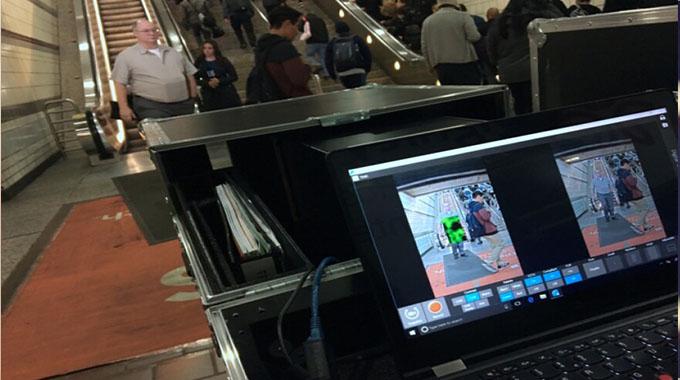News / National
Dubious full-body scanners return on the market
11 May 2025 at 11:31hrs |
0 Views

Despite repeated warnings from health authorities and law enforcement, unlicensed full-body scan operators continue to spread across Zimbabwe, duping unsuspecting residents with questionable diagnoses and expensive herbal remedies.
On Wednesday, a news crew uncovered one such operation at a primary school in Bulawayo's Greenhill suburb. The team, claiming to represent a supplementary medicine distribution company, was charging US$5 per person for instant full-body scans, using what they said was a "magnetic resonance" device linked to a laptop.
The operators boldly claimed the machine could detect dozens of health indicators-from blood sugar levels and blood pressure to cholesterol, kidney function, and liver diseases like cirrhosis and fatty liver. They also asserted it could predict future health conditions and recommend suitable treatments.
However, medical experts and regulatory authorities, including the Medicines Control Authority of Zimbabwe (MCAZ), have consistently discredited such practices. MCAZ has warned that these so-called diagnostic tools are scientifically baseless and that their use by untrained individuals often leads to false diagnoses and emotional distress.
"This is pure pseudoscience," said one Bulawayo-based doctor. "A person simply placing a hand on a device cannot possibly yield comprehensive medical results. These operations are dangerous and exploitative."
During the investigation, one dissatisfied client expressed regret after receiving a diagnosis that bore no resemblance to her symptoms. "The scan listed several illnesses, but I didn't feel any of those things," she said. "I felt pressured to buy herbs that I wasn't sure I needed."
Following the scans, operators push herbal remedies that cost anywhere from US$20 to over US$100. Some clients reported being coerced into purchasing the products immediately after receiving alarming diagnostic results. When the news team posed as potential clients and attempted to defer payment, they were told the operators were leaving for Dubai the next day and urged to return with the money the same day.
Authorities say these schemes often begin with free scans to lure people in before bombarding them with dire health warnings to pressure them into buying unverified treatments.
MCAZ has clarified that for any complementary medicine to be legally approved in Zimbabwe, it must go through a rigorous application process. This includes submitting an official CM-1 form, providing a breakdown of ingredients, and undergoing an evaluation by the authority's Registration Division. Many rogue sellers falsely believe that a certificate from the Traditional Medicines Practitioners Council gives them the right to sell complementary medicines.
"Unfortunately, some of these products don't make direct medicinal claims, which makes regulation challenging. Legal action can only be taken once they advertise them as cures, especially on platforms like social media," said an MCAZ official.
The continued rise of these scan operators highlights a growing public health concern, as financially vulnerable Zimbabweans are being misled and emotionally manipulated under the guise of modern diagnostics and wellness.
Health authorities urge members of the public to seek medical advice only from licensed professionals and to report any suspicious health operations to the police or MCAZ.
On Wednesday, a news crew uncovered one such operation at a primary school in Bulawayo's Greenhill suburb. The team, claiming to represent a supplementary medicine distribution company, was charging US$5 per person for instant full-body scans, using what they said was a "magnetic resonance" device linked to a laptop.
The operators boldly claimed the machine could detect dozens of health indicators-from blood sugar levels and blood pressure to cholesterol, kidney function, and liver diseases like cirrhosis and fatty liver. They also asserted it could predict future health conditions and recommend suitable treatments.
However, medical experts and regulatory authorities, including the Medicines Control Authority of Zimbabwe (MCAZ), have consistently discredited such practices. MCAZ has warned that these so-called diagnostic tools are scientifically baseless and that their use by untrained individuals often leads to false diagnoses and emotional distress.
"This is pure pseudoscience," said one Bulawayo-based doctor. "A person simply placing a hand on a device cannot possibly yield comprehensive medical results. These operations are dangerous and exploitative."
During the investigation, one dissatisfied client expressed regret after receiving a diagnosis that bore no resemblance to her symptoms. "The scan listed several illnesses, but I didn't feel any of those things," she said. "I felt pressured to buy herbs that I wasn't sure I needed."
Authorities say these schemes often begin with free scans to lure people in before bombarding them with dire health warnings to pressure them into buying unverified treatments.
MCAZ has clarified that for any complementary medicine to be legally approved in Zimbabwe, it must go through a rigorous application process. This includes submitting an official CM-1 form, providing a breakdown of ingredients, and undergoing an evaluation by the authority's Registration Division. Many rogue sellers falsely believe that a certificate from the Traditional Medicines Practitioners Council gives them the right to sell complementary medicines.
"Unfortunately, some of these products don't make direct medicinal claims, which makes regulation challenging. Legal action can only be taken once they advertise them as cures, especially on platforms like social media," said an MCAZ official.
The continued rise of these scan operators highlights a growing public health concern, as financially vulnerable Zimbabweans are being misled and emotionally manipulated under the guise of modern diagnostics and wellness.
Health authorities urge members of the public to seek medical advice only from licensed professionals and to report any suspicious health operations to the police or MCAZ.
Source - zimpapers
Join the discussion
Loading comments…



























